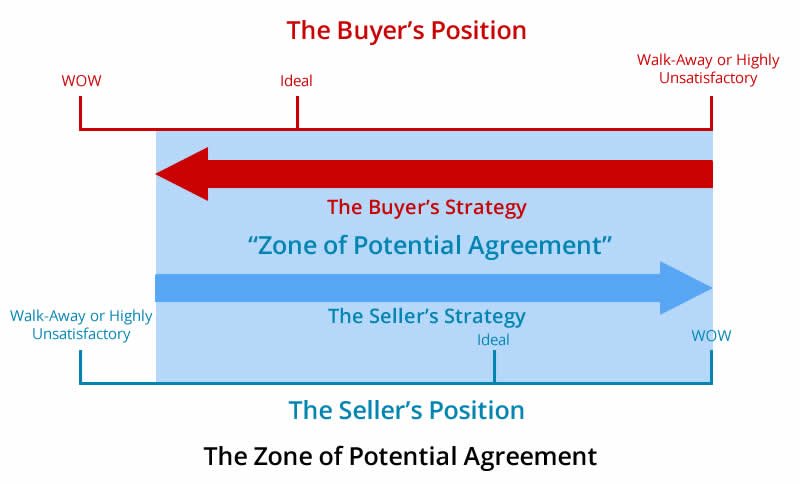There is nothing quite so empowering to a negotiator that knowing that they can walk away from the deal if necessary. This hugely important factor enables them to be assertive on their goals, confident that if an acceptable deal is not reached, they have an alternative option. Similarly, the other party will sense this too and will be commensurately wary of pushing too hard. Unfortunately, the opposite is true too! Having no alternative, such as in a monopoly situation, can leave you in a very vulnerable position.
However, walking away from a tense negotiation is never easy, particularly after you have invested time and effort in it, and you emotionally want the deal! It is even worse when you feel that the deal is there for the taking but then slips through your fingers – that feels like a loss.
There are a number of steps which will help you avoid getting to that point in the negotiation where you’re already in so deep that to walk away would be too painful. Defining the potential deal breaking factors early can save everyone time and effort, not to mention the stress of a high-stakes negotiation that winds up breaking down.There are normally only a few key tradables which can genuinely cause the breakdown. These might include the price, the time schedule, and the chemistry or gut feel between the two parties. This are issues of high importance, which if not resolved or negotiated effectively, should cause a walk-away. For example, if the price is not right, you will feel exploited. So, you need a “below this, I walk” number firmly in mind. Having a firm number as part of your preparation is absolutely crucial. However, be sure to do your preparation thoroughly so that when you do fall below this number, you do walk away. We have seen numerous cases where the negotiators have hit the walk-away number but kept on going. In this instance, the walk-way number was not the real walk-away number!!
Knowledge is power, and the more power you’re armed with, the better you’ll fare in the negotiation. Before entering the negotiation, do your preparation to understand your position and options as well as the other party’s.
But how do you know when it’s time to walk away? This requires you to understand your ‘Zone of Agreement’.
Each party in a negotiation has a desired outcome and a worst-case scenario. In a sales negotiation, the seller’s asking price is their desired outcome, but they should also know the lowest price they’ll accept to still do the deal in the worst case. The buyer should also enter the negotiations with a desired low price point while understanding the highest price she’s willing to pay in the worst case (the walk-away).

The zone of possible agreement exists between each party’s walk-away position, not their WOW or Ideal point. If there is no overlap between the walk-away positions, there is no zone of agreement. Most importantly, if you don’t know your worst case or walk-away, you’ll risk giving up too much. At this point, you should walk away because you aren’t prepared.
When you’re prepared to walk away, you will have an established Best Alternative to a Negotiated Agreement (or BATNA). This is essentially your fall-back position if your final offer fails in any of the key tradables. This is what you will do if you fail to reach agreement. Successful negotiators always know their BATNA before entering a negotiation.
Curiously, ‘No’ can be very powerful word! But it doesn’t necessarily mean it’s over. By walking away from a potential deal, you’ll learn how much the other party wants to work with you. We’ve walked enough times that we’ve learned to appreciate the power of “no.” If the client is seriously interested in working with us, pulling out will force them to try and get us back. Or they’ll be relieved and let us walk. Either way, you’ll get resolution.
Of course, not everyone has the luxury of walk-away to the same degree, and you may be pressured to take on a bad deal because you have no alternative (or BATNA). This is bad news! In this instance, you need to get the best terms you possibly can and then work furiously to make sure that you are never boxed into this situation again. Finally, remember sometimes ‘No deal is better than a bad deal’!!
Whenever we walk away from an opportunity, we might initially regret that we couldn’t make the deal work. Eventually, though, we realise we’ve done the right thing: we’ve retained our self-respect—and probably gained their respect, too. Don’t burn bridges; there may always be another chance to work together. Even if you do need to walk away, do it in a civil and courteous manner. You don’t want to sever all ties with the other party. In fact, walking away may convince the person to call you back with a better deal.
You don’t have to walk away from every negotiation, but it sure helps if you know you can. A walk-away point should be determined before you even approach the table, as it provides you with the confidence you’ll need to successfully negotiate.
In order to walk away without getting scared, flustered, or frustrated by negotiations, you need to prepare for the negotiation.
Walking away is a powerful statement that displays confidence, courage, and integrity. Even if you never do a deal with that person, you’ll have successfully branded yourself as a person of honour. You can walk around with your head held high knowing you stand for something worthwhile, and word of your savviness will spread.